10 living room fireplace ideas – from exceptional style to perfect placement
These fireplace ideas for living rooms are guaranteed to add warmth to your lounge

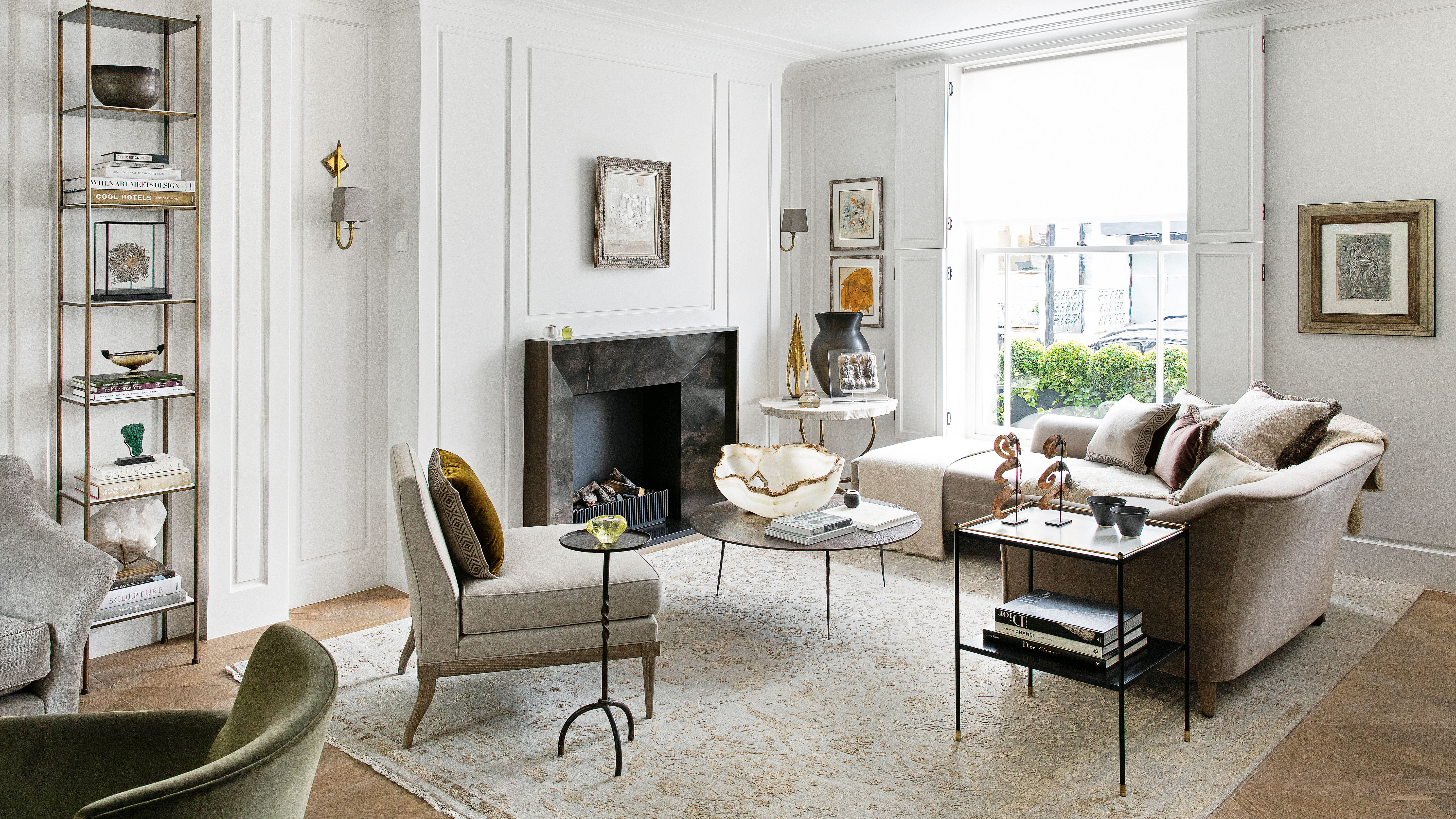
Design expertise in your inbox – from inspiring decorating ideas and beautiful celebrity homes to practical gardening advice and shopping round-ups.
You are now subscribed
Your newsletter sign-up was successful
Want to add more newsletters?

Twice a week
Homes&Gardens
The ultimate interior design resource from the world's leading experts - discover inspiring decorating ideas, color scheming know-how, garden inspiration and shopping expertise.

Once a week
In The Loop from Next In Design
Members of the Next in Design Circle will receive In the Loop, our weekly email filled with trade news, names to know and spotlight moments. Together we’re building a brighter design future.

Twice a week
Cucina
Whether you’re passionate about hosting exquisite dinners, experimenting with culinary trends, or perfecting your kitchen's design with timeless elegance and innovative functionality, this newsletter is here to inspire
The fireplace is the focal point of a living room – the place around which family and friends naturally congregate for an evening of relaxation or entertainment, the hub that beckons us with its welcome warmth and light.
'A living room fireplace is more than a piece of furniture or an architectural decision,' muses Monique Tollgard, founder of Tollgard. 'A fire is a ritual you add to your home and your life. The warmth and grandeur of a fireplace significantly alter a rooms atmosphere even with no logs on or burning brightly.
When it comes to living room ideas, the fireplace becomes not just another design element but a main focal point, so discovering the perfect addition to your space can elevate the room from one of function into one full of ambience and conviviality.
Living room fireplace ideas
Your fireplace ideas can make or break a living space, creating a focal point that inspires the materials and colors within your scheme. Read on to discover our favorite living room fireplace ideas – and see which light a spark for your home.
1. Go for a low living room fireplace
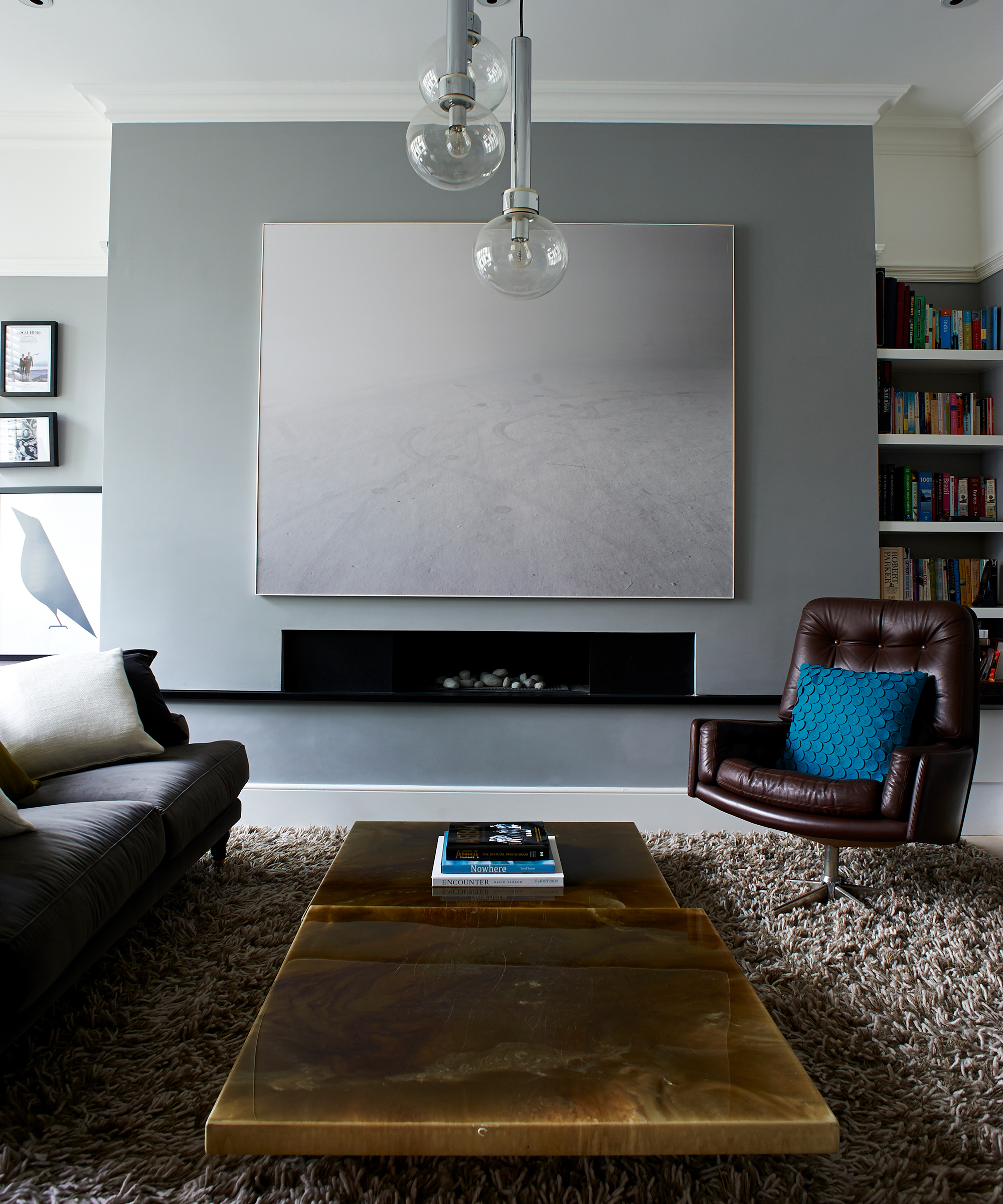
Photography/Jonathan Gooch
To complement and enhance a contemporary look in a home, take a linear approach to your fireplace.
A sleek, horizontal will reflect the clean lines used throughout these spaces, fitting seamlessly in with the overall style. Placing beneath a modernist painting or, if in more of a family living room, allows this subtle design to still take center stage.
This is also a smart choice for minimalist living room schemes, as the lack of mantle prevents any clutter from accumulating over time,
Design expertise in your inbox – from inspiring decorating ideas and beautiful celebrity homes to practical gardening advice and shopping round-ups.
2. Use a fender in a traditional space
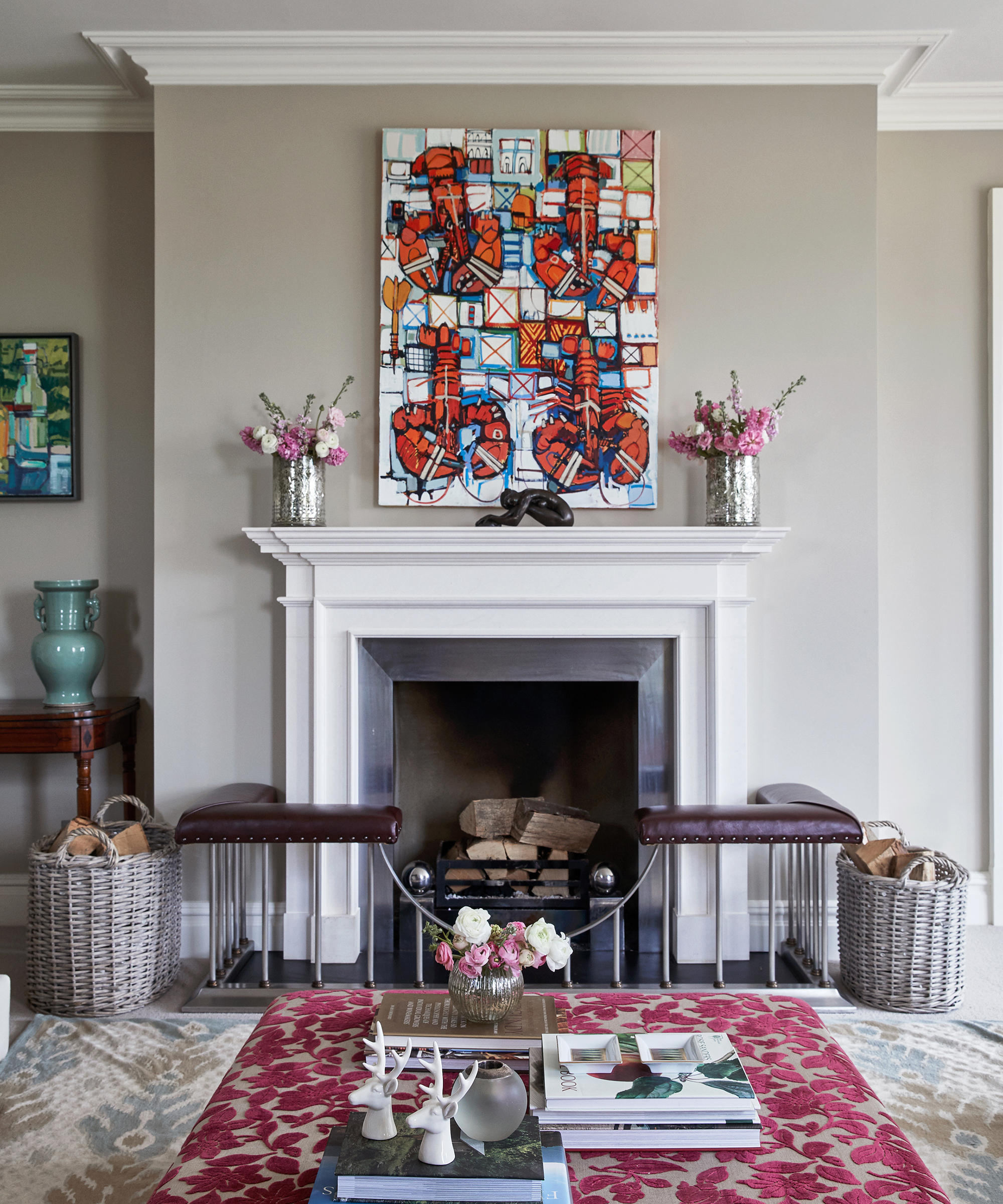
Photography/Davide Lovatti
If you're drawn to more traditional living room interiors, take a cue from classic fireplaces and add an upholstered fender.
As well as preventing ash from entering the room, if you were to make this large enough it can even act as additional seating at peak entertaining times additional seating without taking up previous floor space.
Select a leather covering for a hard-wearing option, but softer materials such as velvets can also be used if it's simply a visual addition rather than expected to be used constantly as seating.
3. Add interest with your backplate
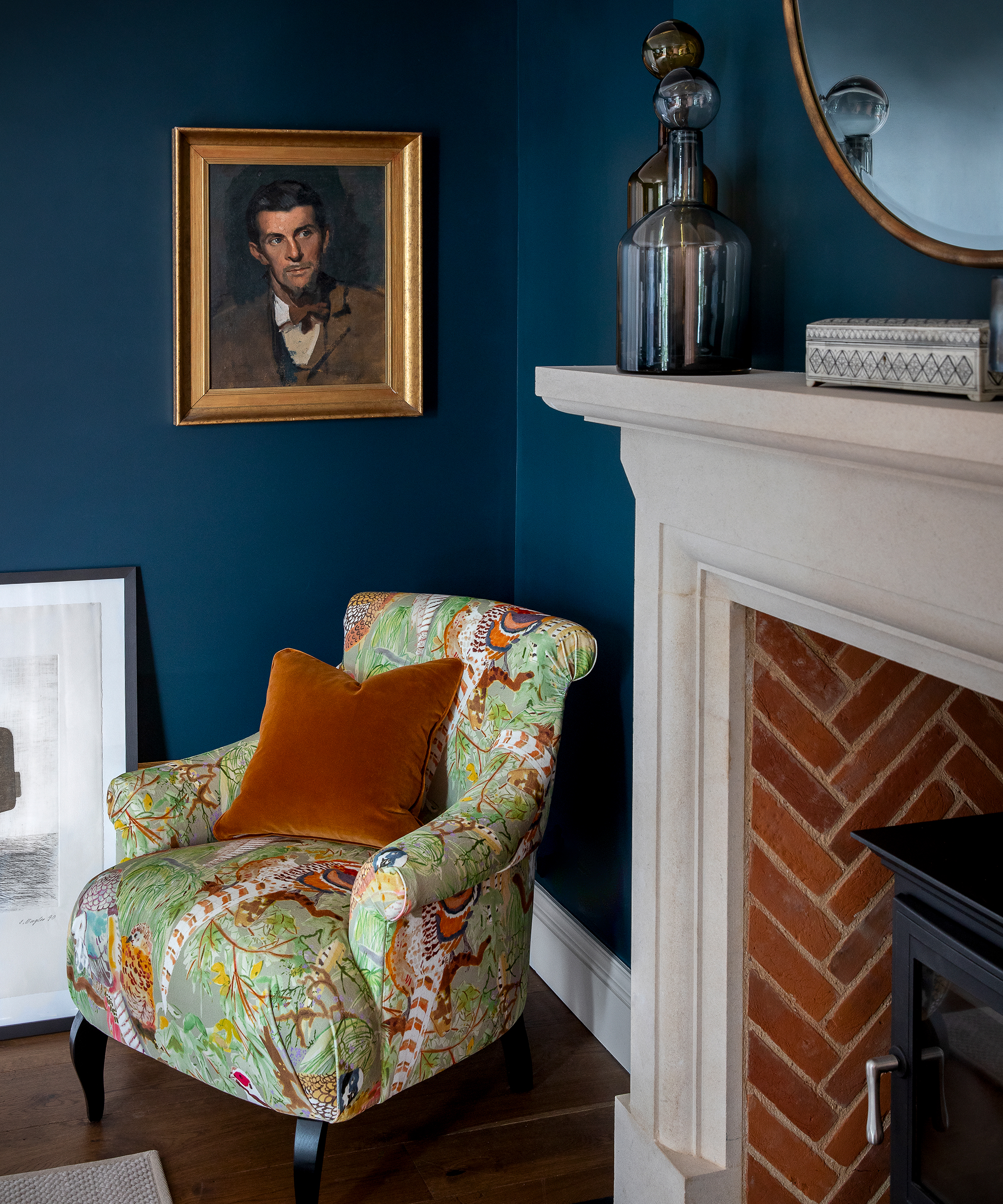
Photography/Paul Raeside
The interior of the fireplace itself is an oft-neglected space for introducing pattern and interest to a scheme.
Traditional fireplaces use iron fire backplates, but swapping this out for a bold fireplace tile ideas – in this case a herringbone brick design – adds a stylish heightened visual interest in an unexpected location, without being overpowering in a pared-back or neutral living room.
4. Hang a mirror above the fireplace
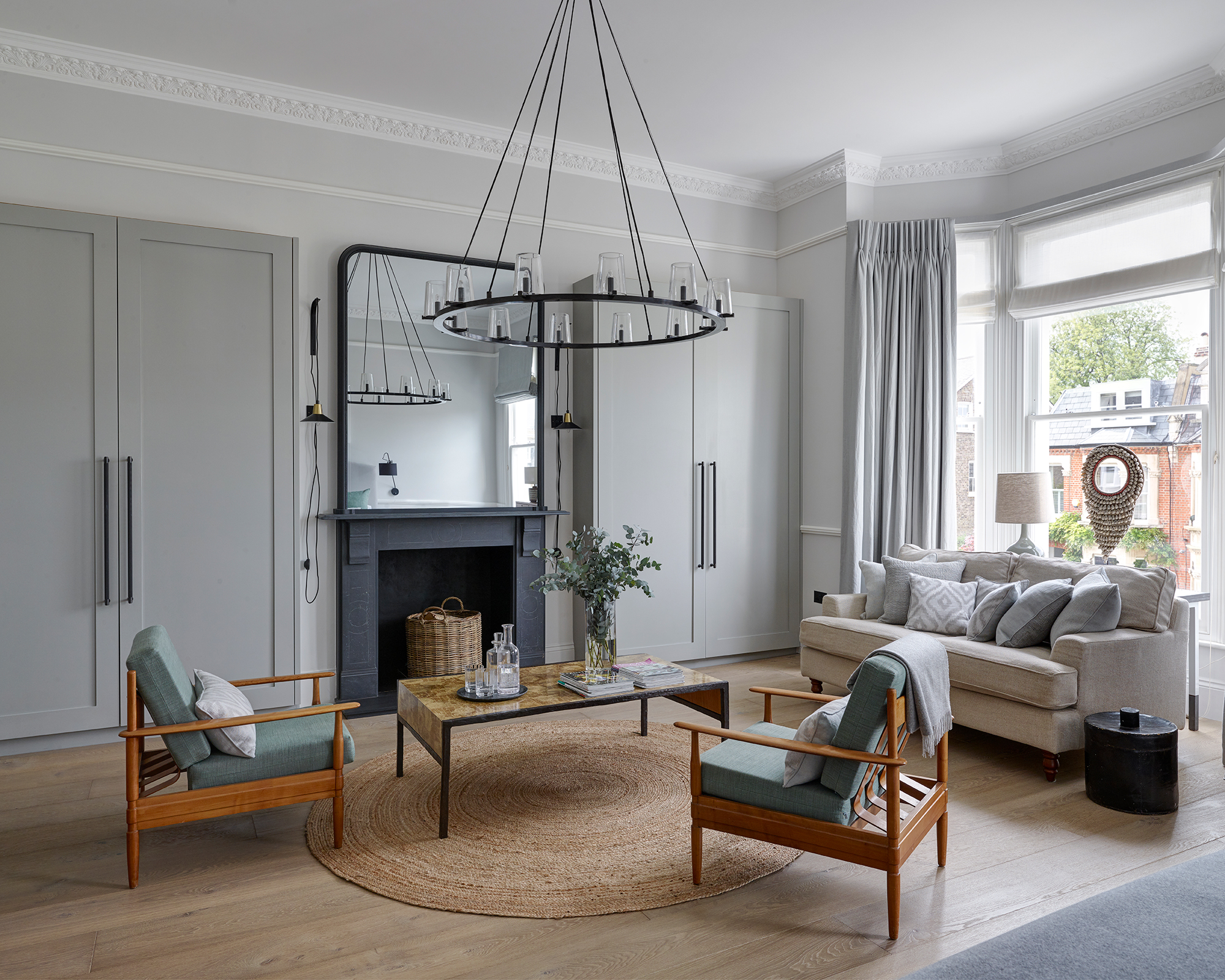
Photography/Richard Powers
Living room mirrors are a popular choice to place above a fireplace, allowing extra light to bounce around a small living room – even when the lights are down low – to allow the fireplace to shine bright.
Yet, rather than a pretty extra, look at tying them into the fireplace structure. Extend the fireplace material upwards, creating a mirror frame that flows organically from the base. Make sure to include a mantle, for both extra stability and to allow the use of gently flickering candles.
5. Take it up a notch
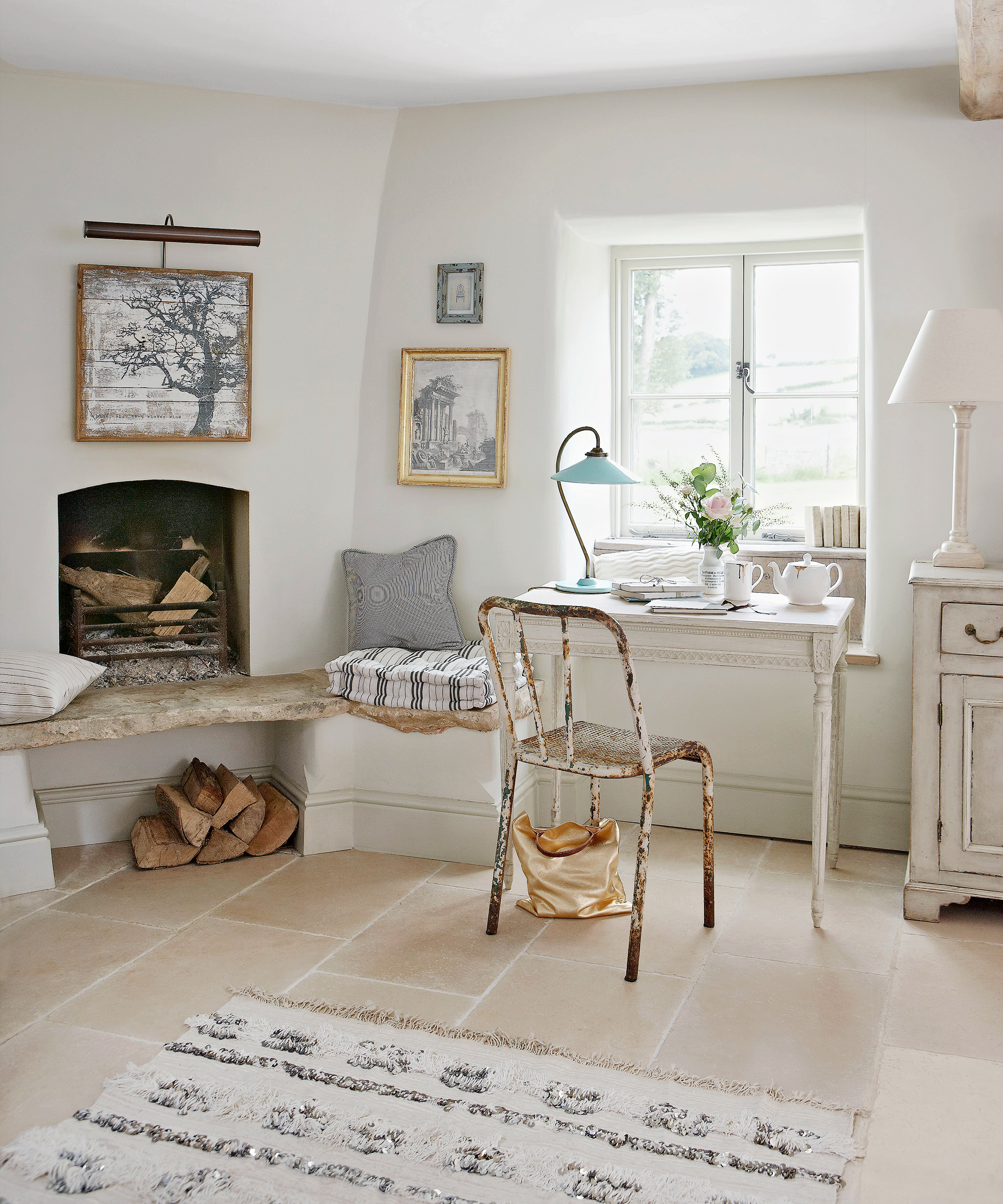
Photography/Jon Day
Traditional wood burning fireplaces are more often than not associated with being straight on the ground, but they don't necessarily have to.
Raising the ground of a fireplace in a living room can give you more flexibility to how to use the space, such as the wooden slat here providing a handy seat. It's also worth considering if you have small children or animals running around.
6. Size up your frame
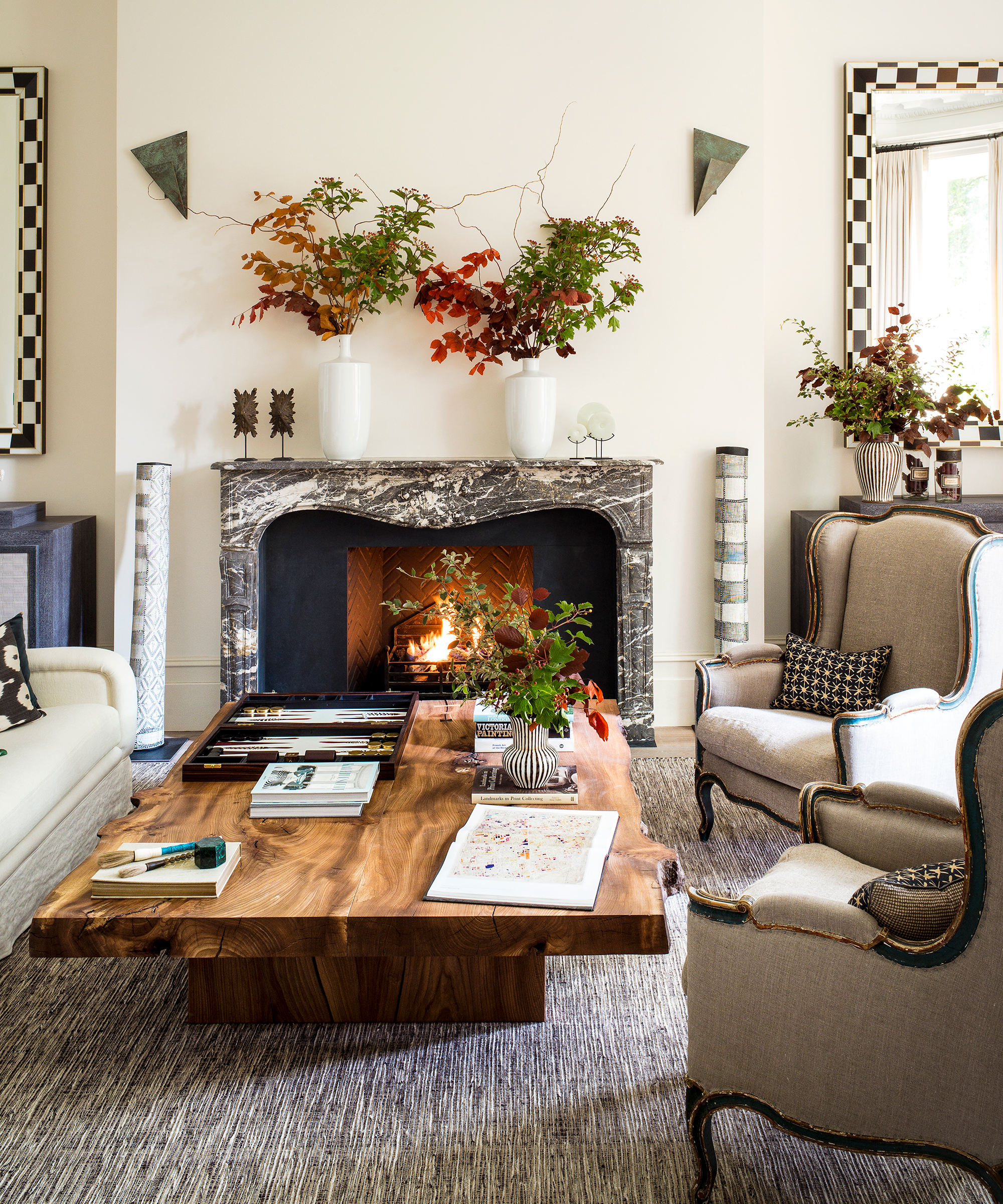
Photography/Paul Raeside
To make sure all eyes are on your fireplace, give it the framing it deserves.
Although the fire surround may seem like the be-all and end-all when framing a fireplace, the insert can add that extra bit of drama that will elevate the whole look.
Choose an interior insert which balances well with the surround, like this dark, dramatic insert picking up on the deepest veins of the marble surround.
7. Make the flue a feature
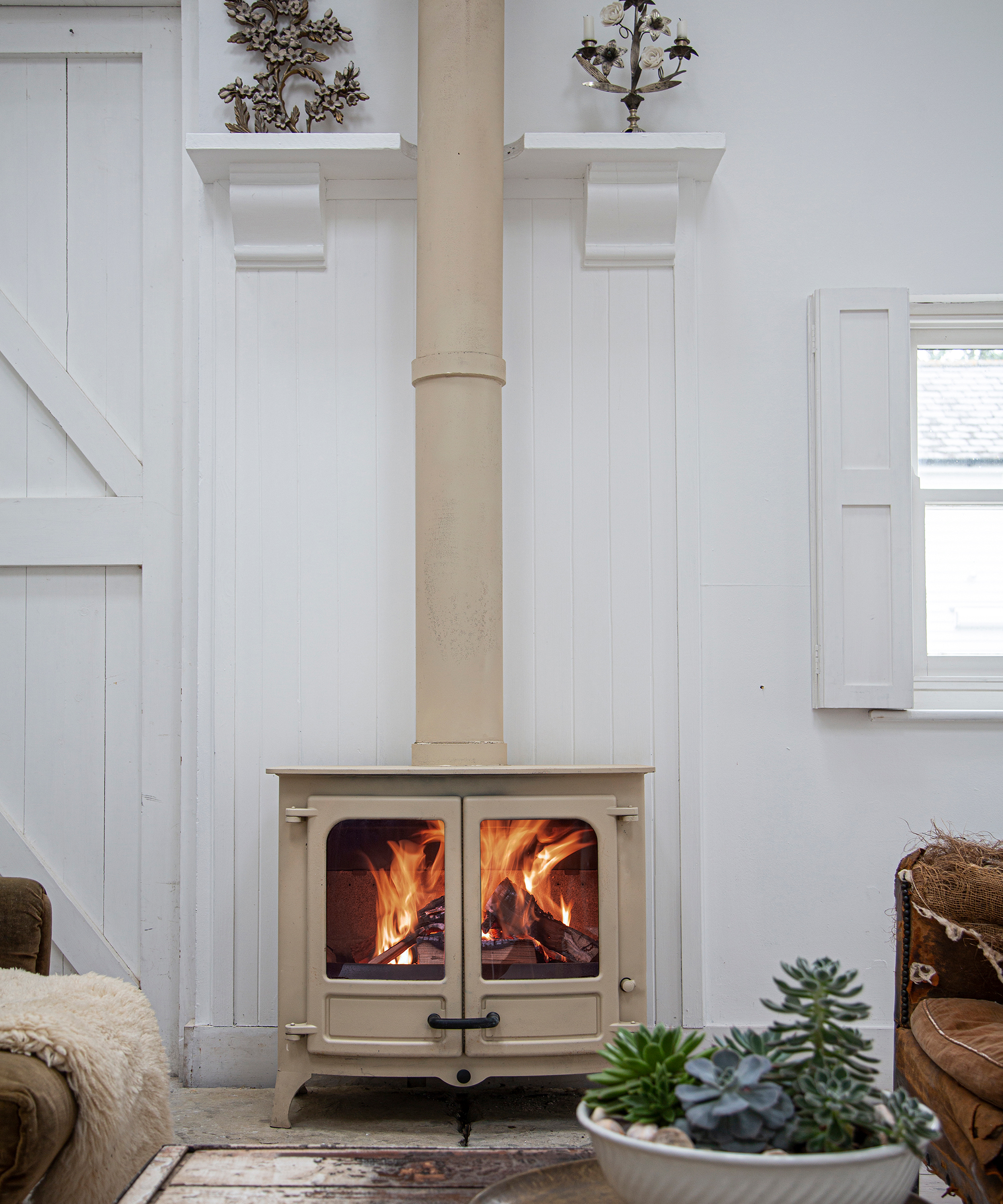
Depending on which fuel your stove takes, you may need a flue, so why not make this part of the feature.
This Charnwood option shows how homey and warming the addition of a fully visible flue can look. A lighter colorway is perfect for a softer touch, but a monochromatic look would be a chic addition to a contemporary space.
8. Take your surround to the floor
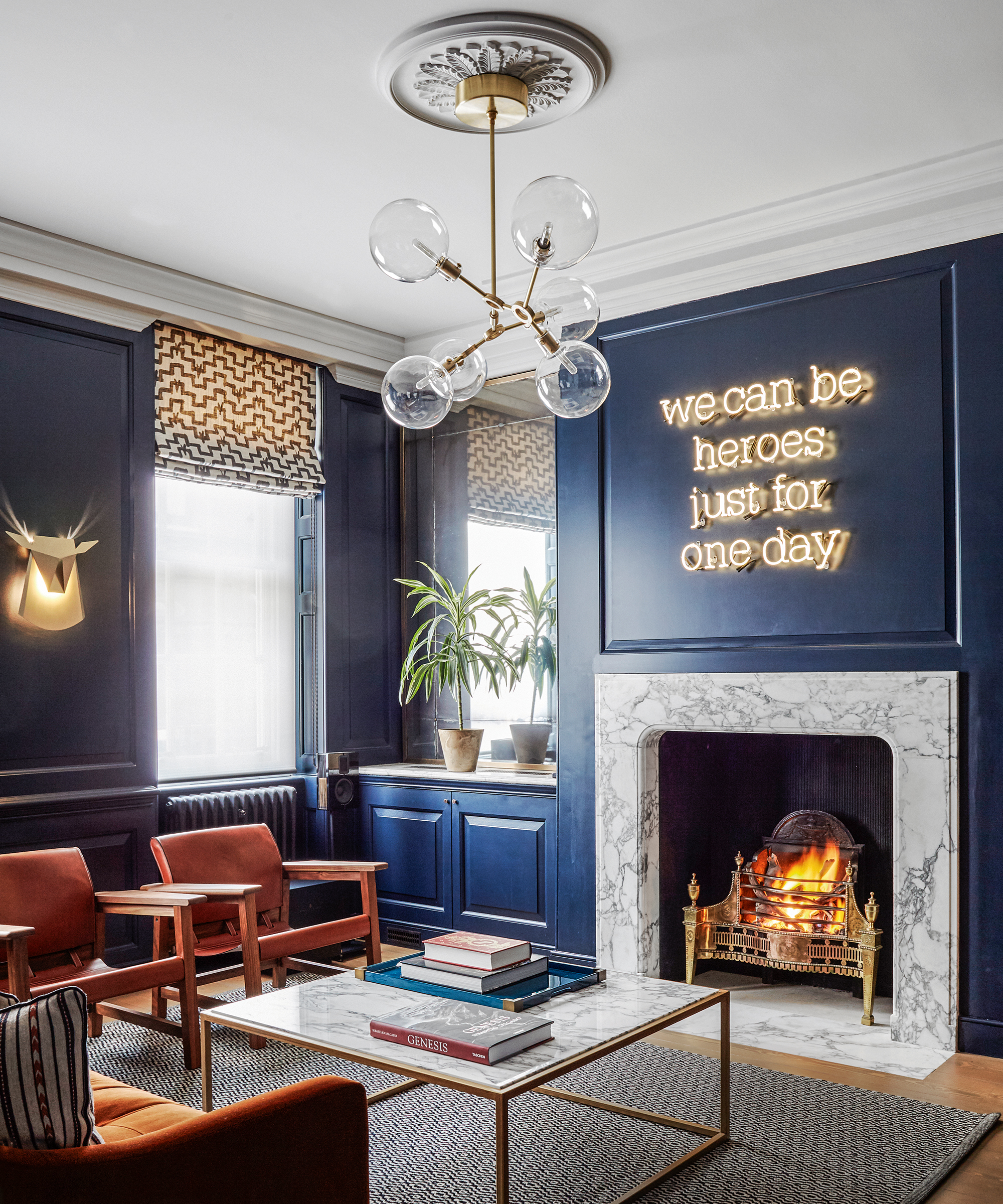
Photography/Brent Darby
For a distinctive, tailored look, double down on the fireplace design. When commissioning a bespoke surround, ask whether a hearth in the same stone can be made to create a smart, integrated finish.
Another tip is to fit the hearth flush into wooden floorboards for a modern feel. Soften hard stone surfaces with natural, textural materials such as a rugs alongside contemporary living room lighting and upholstered furniture.
9. Break the rules
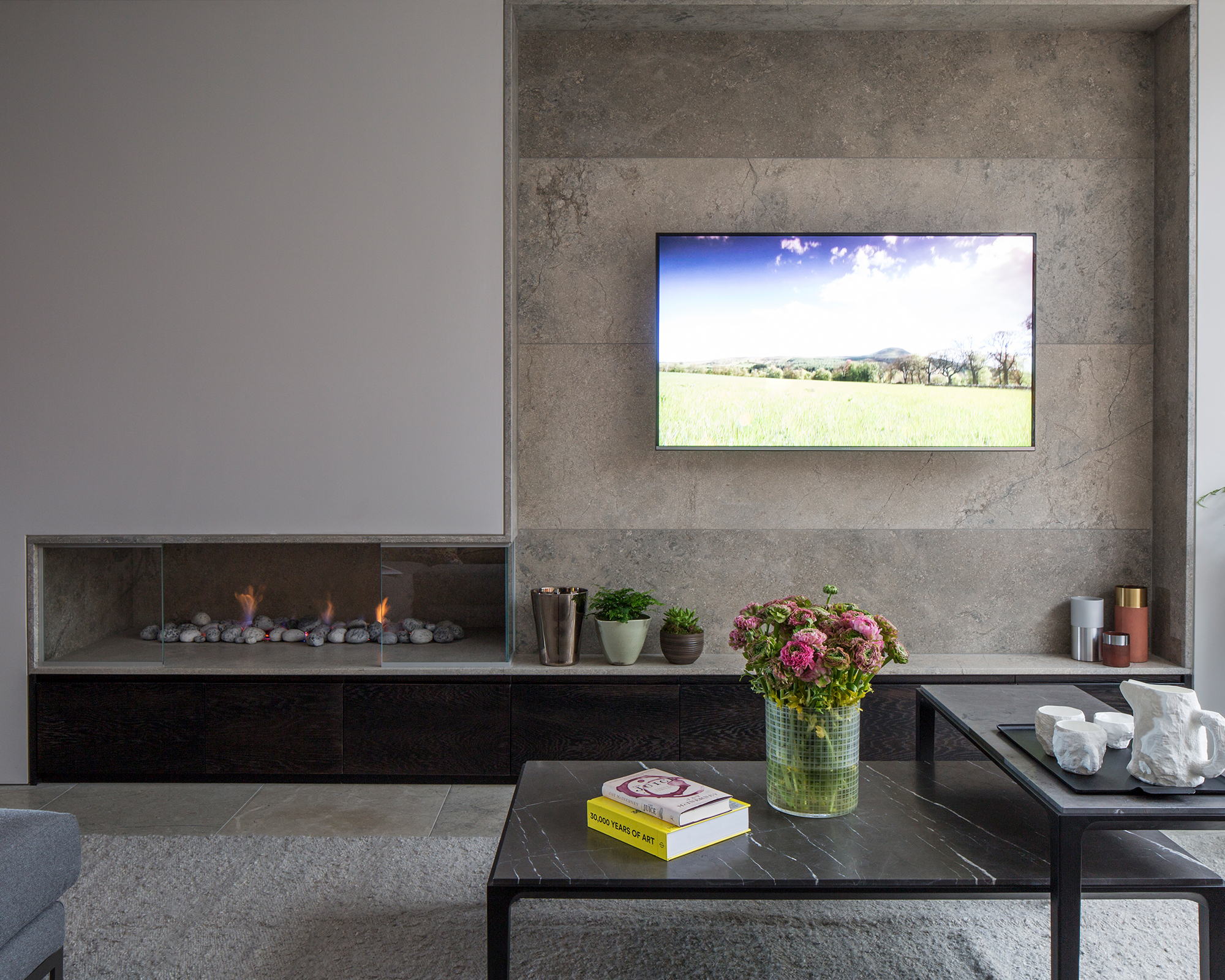
Rules of symmetry say that a modern living room fireplace should sit in the center of a wall – but that’s not always necessary.
In this design from Tollgard, the fireplace extends into an L-shape from the indent in the wall housing the TV, creating visual interest and a natural link between the two.
By having the fire to one side, it's also easier to literally switch off and focus on the fire when lit, plus as it's nearer at eye level than the screen it allows for a more natural visual connection for those in the room.
10. Choose a rustic option in a country living room
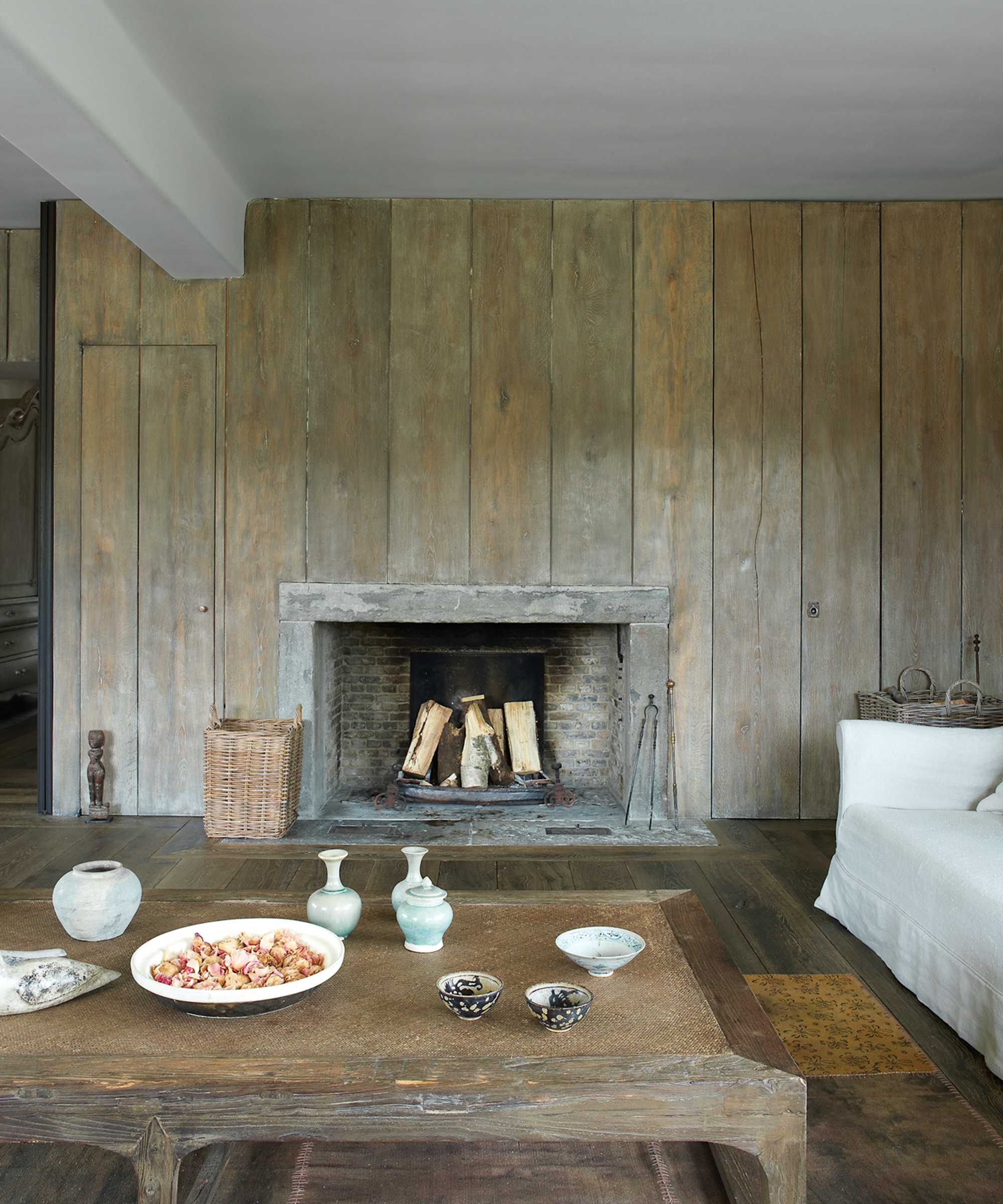
Photography/Mark Luscombe Whyte
Reclaimed natural wooden boards on the walls and floor with an unadorned stone fireplace surround take things back several steps to simpler times in this country living room.
Choosing reclaimed wood may take a bit more work but it’s eco-friendly and has a beautiful patina that new wood needs years to achieve.
How do I choose a fireplace?
Because they are such an emotive piece of our homes, it's important to choose the style which speaks to you and you style the most. That said, there are some additional considerations to keep in mind.
'Think of your stove as a piece of furniture for heating,' advises Cedric Wells, Creative Director of Charnwood. 'A stove is quite a considered investment and one that is likely to remain in the room for many years so choose a classic style that won’t date.'
Size, too, is key. 'It is important you purchase a stove with the correct kW output in relation to the size of your room,' notes Cedric.
'It is better to have a smaller stove that you can burn hard rather than a large stove that produces too much warmth as you will end up opening doors and windows to disperse the heat.'
How do I look after my fireplace?
Once you've selected the perfect fireplace, there are steps to take to ensue it is kept in optimal condition.
'The Spring and Summer months are the perfect time to start thinking about maintenance and preparing your stove for another winter season,' advises Vicky Naylor General Manager, ACR Stoves. 'Remember to have the chimney swept to remove any blockages and build-up of soot and make sure to check door seals for wear and tear.'
Michael Coke, Senior Development Engineer at Stovax, elaborates on maintenance for solid fuel stoves. 'Like your stove, your chimney also requires maintenance. Chimneys need to have a clear passageway for the combustion gases to exit your home. Along with obstructions, soot, deposits and tar can build up in your chimney over time, reducing the draw, making the stove run less efficiently and putting your property at risk of a chimney fire.'
'If you are burning wood, ensure your chimney is swept at least twice a year; this can be reduced to once if you are using a multi-fuel stove to burn fuels other than wood,' continues Michael. 'It is also important to have your stove serviced by a qualified installer to ensure you see the best performance from your appliance.'
For gas fires, 'it is recommended that gas appliances are safety checked and serviced at least once a year by a registered gas service engineer,' reminds Alex Sheldon, Development Manager at Gazco. 'You can find a qualified engineer on the Gas Safe website.
In terms of electric fires, Jack Drew, Electrical Development Engineer at Gazco notes that, 'maintenance of an electric fire is easy and simple, and normally just involves dusting and cleaning the fuel effects, plus any accessible air inlets and outlets in order to maintain the optimum heat output and efficiency from the fire.'
What's better gas or wood fireplace?
There are four categories of fireplace: woodburning, gas burning, ethanol burning and electric – all have their advantages and disadvantages. 'It is important to consider local smoke control restrictions that may be in place in the area,' advises Gazco's Jack Drew.
Wood that’s used for an open fire or stove needs to be stored somewhere dry and with this type of fireplace. Cedric Wells of Charwood notes that a wood burning stove, 'also gives you the freedom from dependence on the large energy utilities. At a time when there is increasing concern over stability of supply throughout the world it is nice to know that a log burner gives, in a most beautiful way, that certainty of warmth during periods of interrupted supply.'
Gas fireplaces are low-maintenance and are renowned for generating good amounts of heat. They also don't require a chimney meaning 'they can be installed virtually anywhere so long as a balanced flue can be fitted,' notes Vicky Naylor from ACR. 'Their temperature control makes them easy to operate and you can have remote control or smart models that allow you to set timers and temperature from your smartphone or tablet.'
Ethanol fires are becoming increasingly popular and are perfect for a contemporary scheme. However, bear in mind that they don’t give out as much heat as gas.
Electric are the cheapest – both to buy and to run. As the country moves to renewable energy sources, the interest in electric fires is expected to soar. 'You can also enjoy its flame effect without the ambient heat, which makes it a great feature all year round,' adds Vicky.

Jennifer is the Digital Editor at Homes & Gardens, bringing years of interiors experience across the US and UK. She has worked with leading publications, blending expertise in PR, marketing, social media, commercial strategy, and e-commerce. Jennifer has covered every corner of the home – curating projects from top interior designers, sourcing celebrity properties, reviewing appliances, and delivering timely news. Now, she channels her digital skills into shaping the world’s leading interiors website.